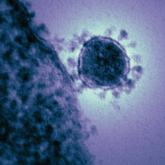The Centers for Disease Control and Prevention and the World Health Organization are continuing to monitor the spread of the newly named Middle East Respiratory Syndrome (MERS) caused by the MERS-Coronavirus (MERS-CoV). As of June 5, 2013, there were 55 confirmed cases worldwide (mostly in the Middle East) resulting in 30 fatalities (54.5%), according to the two organizations.
There is clear evidence of human-to-human transmission, the CDC reported in an overview presented on its website, with aerosol droplet and contact transmission both considered possible. As yet there have been no reports of infection in the United States, although the virus has reached Europe, including France, Italy, and the United Kingdom. The three cases reported in Italy in May were the most recent of the eight reported clusters and resulted from an index case that had recently traveled from Jordan after a 40-day visit. Two more patients were infected after having close contact with that individual.
MERS-CoV (originally referred to as novel coronavirus or nCoV) genetic sequencing has shown that it is similar to coronaviruses found in bats and is not the same as the virus that caused severe acute respiratory syndrome (SARS) in 2003. Patients with MERS typically develop severe acute respiratory illness with symptoms of fever, cough, and shortness of breath, although some patients were reported as having only a mild respiratory illness.
The CDC has developed molecular diagnostic kits for MERS-CoV, which are being made available to state health departments. Although there are currently no travel advisories in place, the CDC is advising individuals who develop a fever and symptoms of lower respiratory illness (such as cough and shortness of breath) within 10 days of traveling from countries in the Arabian Peninsula or neighboring countries to see their health care providers and mention their recent travel. State and local health departments are advised to report patients under investigation (PUI) for MERS-CoV to CDC. These include patients who have all of the following characteristics:
• Acute respiratory infection, which may include a fever greater than or equal to 38° C and cough.
• Suspicion of pulmonary parenchymal disease.
• A history of travel from the Arabian Peninsula and neighboring countries (Bahrain, Iraq, Iran, Israel, Jordan, Kuwait, Lebanon, Oman, Palestinian territories, Qatar, Saudi Arabia, Syria, the United Arab Emirates, and Yemen).
• No other etiology for the illness, including all clinically indicated tests for community acquired pneumonia.
Interim guidance documents for health care providers, health departments, and laboratories are available on the CDC website.
As yet, CDC officials have issued no travel advisories for the countries in which MERS has been detected, and they reported that they are in the process of discussing the development of possible vaccines with industry.
mlesney@frontlinemedcom.com
